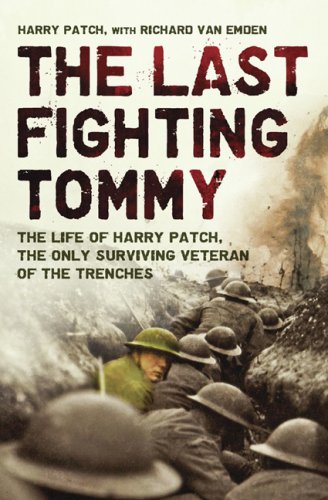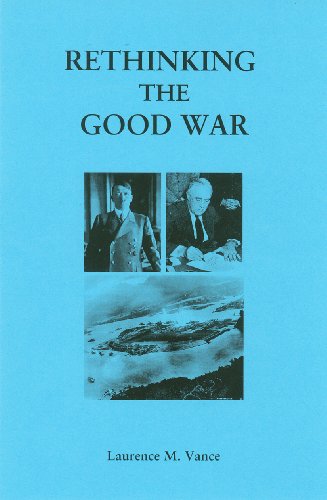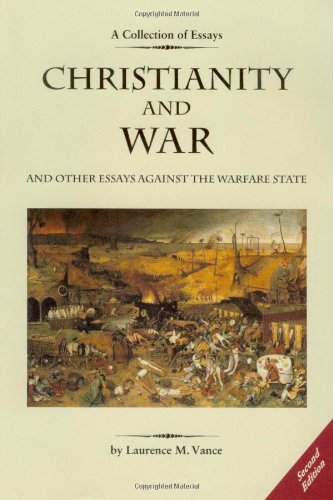We’ve all seen the bumper stickers: “My son is in the Air Force,” “If You Can Read This in English, Thank a Marine,” “Proud Vietnam Veteran,” “Fly Navy,” and of course, “Thank a Vet.” Why should we? Why should we call them heroes, give them military discounts, grant them veterans preference, express our support for them with ribbons on our cars, honor them with a holiday, hold military appreciation church services for them, and thank them for their “service”? Veterans Day began as Armistice Day to commemorate the signing of the armistice that ended World War I. It had nothing to do with honoring current and former members of the military like Veterans Day is celebrated today. And if the sole purpose of Armistice Day was to honor World War I veterans, it should never have been celebrated since no American soldier did anything honorable by intervening in a European foreign war. And it doesn’t matter if he was drafted or not. Britain’s last World War I combat veteran, Harry Patch, died last year at the age of 111. He boasted that he hadn’t killed anyone in combat. “War isn’t worth one life,” Patch said, it is “calculated and condoned slaughter of human beings.” In his autobiography The Last Fighting Tommy, Patch wrote that “politicians who took us to war should have been given the guns and told to settle their differences themselves, instead of organising nothing better than legalised mass murder.” In the last years of his life, Patch warned some young naval recruits that they shouldn’t join.
 The Last Fighting Tommy
Best Price: $0.39
Buy New $32.84
(as of 09:55 UTC - Details)
Frank Buckles, age 109, is the only American veteran of World War I still living. When asked while being honored for his service at a 2007 Veterans Day ceremony at Arlington National Cemetery what he thought about being there while the United States was at war, he replied: “I’m no authority, but I’m not in favor of war unless it’s an emergency.” I think that Buckles is more of an authority on the horrors of war and the folly and wickedness of war than the current members of the Joint Chiefs. It is only because World War I did not turn out to be the “war to end all wars” that the holiday was changed to Veterans Day as a tribute to all soldiers who fought for their country.
The Last Fighting Tommy
Best Price: $0.39
Buy New $32.84
(as of 09:55 UTC - Details)
Frank Buckles, age 109, is the only American veteran of World War I still living. When asked while being honored for his service at a 2007 Veterans Day ceremony at Arlington National Cemetery what he thought about being there while the United States was at war, he replied: “I’m no authority, but I’m not in favor of war unless it’s an emergency.” I think that Buckles is more of an authority on the horrors of war and the folly and wickedness of war than the current members of the Joint Chiefs. It is only because World War I did not turn out to be the “war to end all wars” that the holiday was changed to Veterans Day as a tribute to all soldiers who fought for their country.
 Rethinking the Good War
Buy New $5.95
(as of 12:45 UTC - Details)
Although I believe World War II to be neither necessary nor good, I come not on this Veterans Day to criticize the “greatest generation,” who, it turns out, were also great at pillaging and carousing. For reasons I explained in “U.S. Presidents and Those Who Kill for Them,” World War II marks the permanent establishment of the American military as the president’s personal attack force to kill by his decree Koreans, Vietnamese, Laotians, Cambodians, Grenadians, Panamanians, Yugoslavs, Serbians, Afghans, Iraqis, Somalis, Yemenis, and Pakistanis. Next on the list is Iranians. Sometimes these presidential decrees are rubberstamped by a congressional authorization to use force, but they are always preceded by presidential lies and warmonger propaganda. So why should a Vietnam veteran be proud? He was typically young, ignorant, deceived, and drafted. He may have fought obediently, valiantly, selflessly, and fearlessly, but since he had no business fighting in Vietnam in the first place, I have nothing to thank him for. And I certainly can’t thank him for preventing the Viet Cong from turning America into a socialist republic. Besides, LBJ beat Ho Chi Minh to that anyway. Many Vietnam veterans have written me and expressed shame, remorse, anger, and resentment — not pride — for having been duped into going thousands of miles away from American soil to intervene in another country’s civil war. In fact, I have found that it is those who are not Vietnam veterans who are the most vociferous defenders of the war in Vietnam. The most undeserved and oftentimes disgusting outpouring of thankfulness I have ever seen is over those who have fought or are fighting in Iraq and Afghanistan. The praise and adoration of those fighting in “the front lines in the war on terror” reaches its apex on Veterans Day, which has become a day to defend U.S. wars and recognize all things military. These soldiers certainly have done nothing worthy of thanks. Sure, they have rebuilt infrastructure — after bombing it to smithereens. They no doubt removed a brutal dictator — and unleashed American brutality in the process. And yes, they have rescued orphan children — after blowing their parents and brothers and sisters to kingdom come. What is there to thank our soldiers for? They are not defending our freedoms. They are not keeping us safe from our enemies. They are not protecting us from terrorists. They are not guaranteeing our First Amendment rights. They are not defending U.S. borders. They are not guarding U.S. shores. They are not patrolling U.S. coasts. They are not enforcing no-fly zones over U.S. skies. They are not fighting “over there” so we don’t have to fight “over here.” They are not avenging 9/11. They are not safeguarding the American way of life. Oh, and they are not ensuring that I have the liberty to write what I do about the military.
Rethinking the Good War
Buy New $5.95
(as of 12:45 UTC - Details)
Although I believe World War II to be neither necessary nor good, I come not on this Veterans Day to criticize the “greatest generation,” who, it turns out, were also great at pillaging and carousing. For reasons I explained in “U.S. Presidents and Those Who Kill for Them,” World War II marks the permanent establishment of the American military as the president’s personal attack force to kill by his decree Koreans, Vietnamese, Laotians, Cambodians, Grenadians, Panamanians, Yugoslavs, Serbians, Afghans, Iraqis, Somalis, Yemenis, and Pakistanis. Next on the list is Iranians. Sometimes these presidential decrees are rubberstamped by a congressional authorization to use force, but they are always preceded by presidential lies and warmonger propaganda. So why should a Vietnam veteran be proud? He was typically young, ignorant, deceived, and drafted. He may have fought obediently, valiantly, selflessly, and fearlessly, but since he had no business fighting in Vietnam in the first place, I have nothing to thank him for. And I certainly can’t thank him for preventing the Viet Cong from turning America into a socialist republic. Besides, LBJ beat Ho Chi Minh to that anyway. Many Vietnam veterans have written me and expressed shame, remorse, anger, and resentment — not pride — for having been duped into going thousands of miles away from American soil to intervene in another country’s civil war. In fact, I have found that it is those who are not Vietnam veterans who are the most vociferous defenders of the war in Vietnam. The most undeserved and oftentimes disgusting outpouring of thankfulness I have ever seen is over those who have fought or are fighting in Iraq and Afghanistan. The praise and adoration of those fighting in “the front lines in the war on terror” reaches its apex on Veterans Day, which has become a day to defend U.S. wars and recognize all things military. These soldiers certainly have done nothing worthy of thanks. Sure, they have rebuilt infrastructure — after bombing it to smithereens. They no doubt removed a brutal dictator — and unleashed American brutality in the process. And yes, they have rescued orphan children — after blowing their parents and brothers and sisters to kingdom come. What is there to thank our soldiers for? They are not defending our freedoms. They are not keeping us safe from our enemies. They are not protecting us from terrorists. They are not guaranteeing our First Amendment rights. They are not defending U.S. borders. They are not guarding U.S. shores. They are not patrolling U.S. coasts. They are not enforcing no-fly zones over U.S. skies. They are not fighting “over there” so we don’t have to fight “over here.” They are not avenging 9/11. They are not safeguarding the American way of life. Oh, and they are not ensuring that I have the liberty to write what I do about the military.
 Christianity and War a...
Best Price: $3.46
Buy New $5.96
(as of 12:30 UTC - Details)
What, then, should we thank our soldiers for? Should we thank them for fighting an unconstitutional war, an unscriptural war, an immoral war, an offensive war, an unjust war, or a senseless war? Should we thank our veterans for helping to carry out an aggressive, reckless, belligerent, and interventionist foreign policy? Should we thank the military for sucking $1 trillion out of the federal budget? But, some will say, these soldiers are just doing their jobs. They can’t help it if the U.S. military sends them to fight in an unjust war in Iraq or Afghanistan. They are just following orders. They didn’t enlist in the military to kill people. What would any sane man think about a doctor who takes a job at a hospital knowing that the hospital instructs its doctors to euthanize old and sickly patients — and then says he was just doing his job, following orders, and didn’t take the job to kill people?
Christianity and War a...
Best Price: $3.46
Buy New $5.96
(as of 12:30 UTC - Details)
What, then, should we thank our soldiers for? Should we thank them for fighting an unconstitutional war, an unscriptural war, an immoral war, an offensive war, an unjust war, or a senseless war? Should we thank our veterans for helping to carry out an aggressive, reckless, belligerent, and interventionist foreign policy? Should we thank the military for sucking $1 trillion out of the federal budget? But, some will say, these soldiers are just doing their jobs. They can’t help it if the U.S. military sends them to fight in an unjust war in Iraq or Afghanistan. They are just following orders. They didn’t enlist in the military to kill people. What would any sane man think about a doctor who takes a job at a hospital knowing that the hospital instructs its doctors to euthanize old and sickly patients — and then says he was just doing his job, following orders, and didn’t take the job to kill people?
 The Revolution that Wa...
Buy New $5.95
(as of 12:45 UTC - Details)
Why are soldiers treated so differently? Why do they get a pass on committing or supporting those who commit murder and mayhem? But, someone else says, the military has lowered its recruiting standards and is scraping the bottom of the barrel. Many soldiers are ignorant about the true nature of the military and U.S. foreign policy. Why should we fault them for their ignorance? Why should they be criticized for unjustly killing Iraqis or Afghans or Pakistanis? They are just following orders. Let’s go back to the doctor I mentioned. Suppose that after he takes a job in ignorance at what he thinks is a reputable hospital he is instructed to euthanize old and sickly patients? What should he do? I don’t know of anyone who would say anything else but that he should quit his job or at least refuse to euthanize anyone. Again, why are soldiers treated so differently? Why do they get a pass on committing or supporting those who commit murder and mayhem? But, comes another reply, soldiers have a term of enlistment. They can’t just quit their jobs. Doctors can walk away from their jobs at any time. Then I guess it all comes down to morality: Be a mercenary and kill for the state or refuse to do so and suffer the consequences of dishonorable discharge and/or imprisonment. It is high time that Americans stop holding veterans and current members of the military in such high esteem. It is scientists, engineers, inventors, businessmen, industrialists, software developers, and entrepreneurs that made America great — not veterans of foreign wars. It is doctors, iron workers, taxi drivers, bricklayers, writers, electricians, and cooks that positively contribute to society — not soldiers. I would like to be able to thank a vet — on Veterans Day and every other day of the year — but I’m still searching for a reason.
The Revolution that Wa...
Buy New $5.95
(as of 12:45 UTC - Details)
Why are soldiers treated so differently? Why do they get a pass on committing or supporting those who commit murder and mayhem? But, someone else says, the military has lowered its recruiting standards and is scraping the bottom of the barrel. Many soldiers are ignorant about the true nature of the military and U.S. foreign policy. Why should we fault them for their ignorance? Why should they be criticized for unjustly killing Iraqis or Afghans or Pakistanis? They are just following orders. Let’s go back to the doctor I mentioned. Suppose that after he takes a job in ignorance at what he thinks is a reputable hospital he is instructed to euthanize old and sickly patients? What should he do? I don’t know of anyone who would say anything else but that he should quit his job or at least refuse to euthanize anyone. Again, why are soldiers treated so differently? Why do they get a pass on committing or supporting those who commit murder and mayhem? But, comes another reply, soldiers have a term of enlistment. They can’t just quit their jobs. Doctors can walk away from their jobs at any time. Then I guess it all comes down to morality: Be a mercenary and kill for the state or refuse to do so and suffer the consequences of dishonorable discharge and/or imprisonment. It is high time that Americans stop holding veterans and current members of the military in such high esteem. It is scientists, engineers, inventors, businessmen, industrialists, software developers, and entrepreneurs that made America great — not veterans of foreign wars. It is doctors, iron workers, taxi drivers, bricklayers, writers, electricians, and cooks that positively contribute to society — not soldiers. I would like to be able to thank a vet — on Veterans Day and every other day of the year — but I’m still searching for a reason.
Thank a Vet?
November 11, 2010
Political Theatre
- Mass Media Promotes Eating Bugs
- Biden Claims the Mantle of Cesar Chavez, While Ignoring the Labor Leader’s Opposition to Illegal Immigration
- Who Owns the World? – Explore EVERY angle
- Superb Analyses of Trump’s NY Political Persecution Trial
- Superb Analyses of Trump’s NY Political Persecution Trial
- The Trilateral Commission – Explore Every angle
- Assyrian bishop stabbed in Australian church attack
- Enlisting in the US Military: A Very, Very, Bad Idea: Fred Reed
- Hilarious
- “Read Ludwig von Mises, Motherf**kers!”
- MORE
LRC Blog
- Speaker Johnson Rolls Out MASSIVE Foreign Spending Bills. Zero For US Border.
- A Landmark in Broadcasting and Telling Truth to Power – The Historic 2008 Lew Rockwell Interview With Naomi Wolf
- The Renato Moicano Effect on Austrian Economics
- von Mises goes viral
- “The Worst Televised Massacre of Helpless Civilians in the History of the World”
- Root of All Evil
- Will Israel Escalate?
- Mises Makes It Big Time
- “If You Care About Your . . . Country Read Ludwig von Mises”
- Another Potential River Bridge Catastrophe
- MORE






